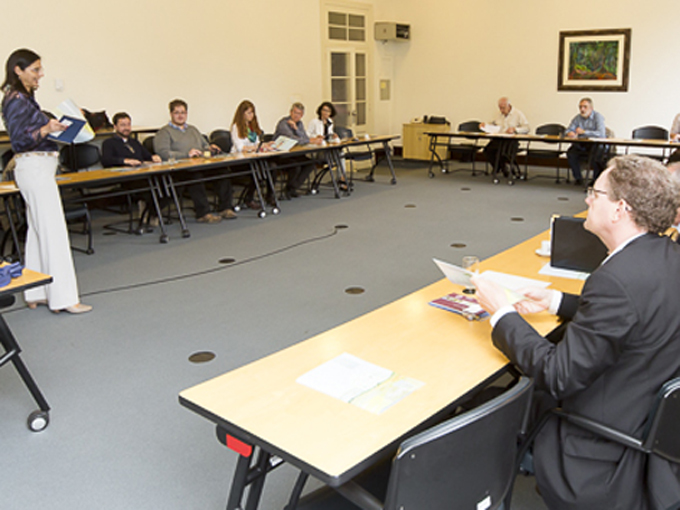On May 23rd, 2014, Luiz de Queiroz College of Agriculture (ESALQ) received a German delegation composed of representatives from the German Federal Ministry of Education and Research, global companies and institutions related to biotechnology. In order to get to know the Campus and the research related to Bioeconomy, the 23-people group was welcomed by Professor Carlos Cerri, from the Center of Nuclear Energy in Agriculture (CENA), and by the Vice-dean of ESALQ, Professor Marisa d'Arce.
The visit aimed to bring together researchers of the State of São Paulo and Germany, in order to identify potential research areas and develop future cooperation programs. According to Professor Cerri, the Germans have shown to have great expertise in Bioeconomy, which makes it easier to establish some common research areas. “We are in the Year of Germany in Brazil, and Germans are not interested only in ethanol but also in other fuels such as palm oil. Our progress in agriculture has gained great visibility abroad, allowing this knowledge exchange.”
Manfred Kircher, Advisory Board Chairman of the German association CLIB 2021, says that Brazil is seen as the future Bioeconomy hub, and this is due to two main features. “The first one is related to the abundance of biomaterials and biomass resources, such as sugar cane, palm oil and soybean oil.” Besides this type of large-scale production, such as ethanol and other fuels, Kircher also highlights the interest in processes involving value-added chemicals, such as the production of polyethylene, cosmetics and food additives. “The second feature is that we have seen a number of universities, companies and research institutes here that distinguish Brazilian science and technology production and can leverage Bioeconomy development.”
The delegation visit to ESALQ was part of the schedule for the German-Brazilian Bioeconomy Forum held by São Paulo Research Foundation (FAPESP). Since May 21st, the group participated of meetings on research topics related to this field. “We have selected three main topics for discussion, so that FAPESP and the German institutions can open calls for proposals in the following months,” said Diego Muñoz, technical adviser of the Scientific Board of Directors at FAPESP.
According to Kircher, German initiatives aim at creating possibilities for the development of materials produced in Brazil, in order to enhance ethanol and sugar cane production chains, as well as value-added materials, bringing them to Germany for transformation into consumer products. “At the same time, we wish to bring products from German companies included in this delegation to be used in technological processes in Brazil,” he says.
The Chairman also noted that ESALQ has worked together with Evonik Industries, a member of the delegation, to produce biofuels. “Evonik produces catalysts for biofuels in Germany and exports them to Brazil. On the other hand, Brazil can also export biomass. This is the type of relationship we are trying to develop, as our countries have become experts in technologies that are complementary, and such partnerships can be beneficial to both nations,” he concludes.
The delegation was composed of: Gunter Festel, Autodisplay Biotech; Stefan Lampel and Veronika Deppe, BMBF - Federal Ministry of Education and Research; Manfred Kircher and Vera Haye, CLIB2021; Jochen Michels, DECHEMA; Detlef Männig and Volker Wehber, Evonik Industries; Sabine Krieg, Fraunhofer IGB; Görge Deerberg and Tim Schulzke, Fraunhofer UMSICHT; Nicolai David Jablonowski, Jülich Research Center; Jürgen Rabenhorst, Ostwestfalen-Lippe University of Applied Sciences; Daniel Alexandre Neuwald, Kompetenzzentrum Obstbau Bodensee; Joachim Venus, Leibniz Institute for Agricultural Engineering (ATB); Dominik Stollenwerk, FH Aachen University of Applied Sciences - Nowum-Energy; Felix Jacob and Nursen Sözer, RWTH Aachen University - Inst. of Biotechnology; Skander Elleuche, Hamburg University of Technology - Inst. of Technical Microbiology; Volker Wendisch, Bielefeld University – CeBiTec; Erhardt Gabriele, University of Hohenheim - International Office; Ricardo Schuch, University of Münster - Centro Brasileiro; Angelika Wurbs, Leibniz Centre for Agricultural Landscape Research (ZALF).


